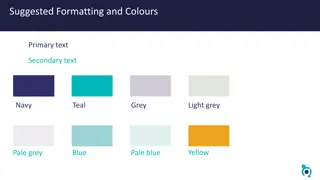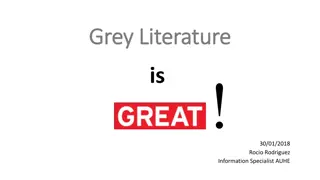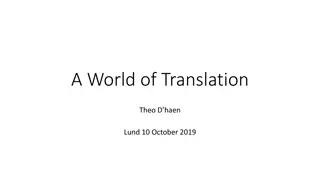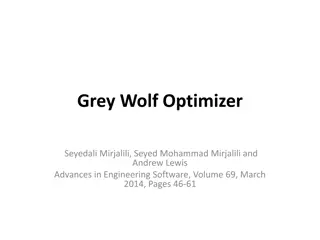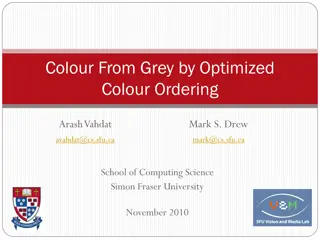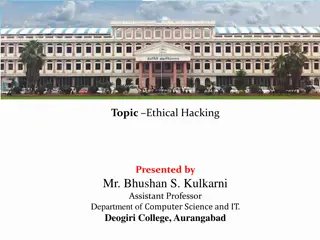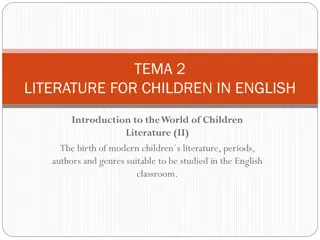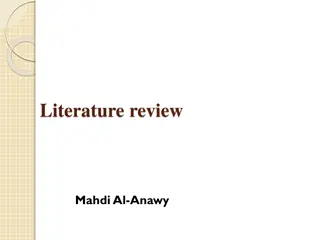
Grey Literature: What, Why, and How
Explore the world of grey literature with insights on what it is, why it's valuable, and how to access it. Grey literature encompasses reports, government documents, theses, and more, offering a wealth of up-to-date and niche information beyond traditional academic sources. Discover the tools and resources to navigate this valuable research landscape effectively.
Download Presentation

Please find below an Image/Link to download the presentation.
The content on the website is provided AS IS for your information and personal use only. It may not be sold, licensed, or shared on other websites without obtaining consent from the author. If you encounter any issues during the download, it is possible that the publisher has removed the file from their server.
You are allowed to download the files provided on this website for personal or commercial use, subject to the condition that they are used lawfully. All files are the property of their respective owners.
The content on the website is provided AS IS for your information and personal use only. It may not be sold, licensed, or shared on other websites without obtaining consent from the author.
E N D
Presentation Transcript
Grey literature What, Why, How Helen Whittaker
What is Grey literature Grey literature is resources and materials that are produced outside of traditional academic or commercial channels. Grey literature includes: - Reports, government documents, working papers - Conference papers and proceedings - Dissertations and theses - Policy documents and guidelines - Clinical trials - Preprint articles - Social media
Why use Grey Literature Grey literature can be more current than formally published research, such as articles and books which go through a lengthier peer review or editorial process. It can identify forthcoming or more niche research. Not everyone is able to publish with mainstream publishers. Grey literature provides researchers with alternative methods of publication. It can enable you to find research not found in your database searches. As with any resource, assess for reliability, currency, potential bias and authority. Keep a record of what you find and where you searched.
Information tools to help you find Grey Literature There are a number of information and research tools that can help you find grey literature. Key tools include: - Databases - Library Catalogues - Organisational websites - Government websites - Statistical websites - Internet search engines, eg Google Scholar https://scholar.google.com
Specific resources to find Grey literature: Conferences Theses
Conference proceedings - what are they Conferences are a major source of current research. At conferences, researchers present a paper on their research. There is no standard way to publish them. They may be presented as a brief online paper, as articles within a journal, or as books of conference proceedings. Sometimes they are not published and may only be available from the authors. Conferences can also be called meetings, seminars, congresses or workshops.
Conference proceedings - how to find them Web of Science - access from the Databases list on the library webpages - A multidisciplinary database, contains Conference proceedings. Refine your search results from the list of document types on the left of your results. Google Scholar - https://scholar.google.co.uk/ - includes conference papers. Search by keyword and add the word conference to your search and a date if needed, eg conference diabetes Databases - Other databases include some conference papers. Search by keyword and add the word conference, eg climate change and conference - Go the Course resource webpages for relevant databases for your subject area https://www.brookes.ac.uk/library/resources-and-services/course-resource-help
To access Web of Science, go to the library homepage at www.brookes.ac.uk/library Select Databases above the search box From the A- Z list, select W At the next screen, select Web of Science Click Search Collection
Type your search into the search box Refine your results from the list of options, eg by Document type and Proceeding paper
Theses Theses are extended pieces of academic writing detailing an author s research findings. They may not be formally published but can be available through open access sources and repositories. LibrarySearch www.brookes.ac.uk/library includes Oxford Brookes theses. Carry out a search and refine your results by selecting Thesis, Dissertation below Format and Books .
Theses Our Institutional Repository RADAR https://radar.brookes.ac.uk/radar also contains details of our online theses: Select Student Research and eTheses . Browse all or by faculty, department, year. The Library s Theses webpages contain links to a number of resources to help you find worldwide theses, eg ProQuest Dissertations, Ebsco Open Dissertations https://www.brookes.ac.uk/library/resources-and-services/for-researchers/theses
Preprint articles Policy documents and guidelines Government, Organisational, Statistics resources
Preprints A preprint is a full draft research paper that is shared publicly before it has been peer reviewed, enabling researchers to share their results quickly and freely. Examples of preprint services include: OSF Preprints access to preprints in a range of subjects: https://osf.io/preprints Preprints - a multidisciplinary preprint platform: https://www.preprints.org/ SSRN - multidisciplinary platform, with preprints: https://www.ssrn.com/index.cfm/en/ Web of Science database includes the Preprint Index Details of more preprint services are on our webpages: https://www.brookes.ac.uk/library/resources-and-services/for-researchers/keeping-up-to-date#articles
Government and Organisational documents Governments, Departments and Organisations can provide access to policy documents, standards, guidelines, consultations, legislation and statistics. Use internet search engines to find relevant resources, eg Google advanced, to search for topics and type of document https://www.google.co.uk/advanced_search Examples of specific sites: - GOV.UK - the UK government s website providing access to government departments, services and information https://www.gov.uk/ - UN E-Government Knowledgebase provides links to worldwide government websites https://publicadministration.un.org/egovkb/en-us/Resources/Country-URLs
Policy documents and guidelines Policy Commons https://policycommons.net/ - Provides access to policy reports, analyses and working papers from thousands of worldwide policy organizations - Register to access the content. Internet searching - If you need to use the internet, google advanced search provides more of a structure to frame your search https://www.google.co.uk/advanced_search Trip database healthcare https://www.tripdatabase.com/ - Includes health related guidelines, policy documents, patient leaflets
Statistics sources The library s Statistics webpage provides UK and international sources: https://www.brookes.ac.uk/library/collections/statistics Including UK sources & datasets, Global statistical sources, International datasets, Statistics by country or area Key UK sources: Office for National Statistics (ONS) - https://www.ons.gov.uk/ Official statistics on a wide range of topics Gov.uk: Statistics https://www.gov.uk/search/research-and-statistics provides access to statistics from UK government departments and other agencies and public bodies.
News sources Social media Health related grey literature resources
News sources News sources are not considered as grey literature in some subjects but they can be useful sources for finding it, highlighting new research, reports or policies. The library s News source webpage provides useful links: https://www.brookes.ac.uk/library/collections/news-sources There are two key databases which provide access to news sources, access and guides are available from the link above, via Databases for current news sources . - Factiva is an international news database covering national and local newspapers, web sources, trade and professional journals and company financial details. - Lexis+ is primarily a legal database which includes a collection of UK newspapers, broadsheets, tabloids and regional sources.
Social Media Social Media such as blogs, social networking sites, email discussion lists can be useful sources of grey literature as well as networks for scholarly collaboration. Examples include: ResearchGate: https://www.researchgate.net/ academic social network for science and research. Connect, collaborate, find scientific publications Academia https://www.academia.edu/ find new research, track impact, publish LinkedIn https://www.linkedin.com/ Connect with professional community, find collaborative research X (formerly Twitter) social networking site to share news, ideas, research
Health research grey literature resources In addition to the sources already detailed, the following resources can be useful: World Health Organisation https://www.who.int/ links to health topics, information by country, data, and publications - UK Health Security Agency Grey literature index https://ukhsalibrary.koha- ptfs.co.uk/greylit/ - Social Care Institute for Excellence https://www.scie.org.uk/ - The King s Fund https://www.kingsfund.org.uk/ independent charity working to improve Health and Social Care - International Clinical Trials Registry Platform (ICTRP) https://trialsearch.who.int/ - ClinicalTrials.gov https://clinicaltrials.gov/ information on clinical research studies -
For further help contact your Librarian https://www.brookes.ac.uk/library/resources-and- services/course-resource-help





